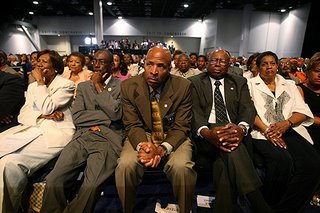In Mortal Chains, Who In Power
Sometimes, I notice someone's speaking in code.
When the hair-twisting mommy says, "Like other vaccines, it's about prevention" I get out my 3-D glasses and decoder ring. Why? Leaving aside the hipster silliness of about, all vaccines prevent disease and infection. And people don't say things like "It's about prevention" unless people are talking about it being formulated to do something else. In Australia, fundamentalists say Gardasil kills girls but the data is full of holes. People can say anything, but it doesn't have to be true or useful. Could parents be confused by what something is and what someone says it does? Yep. Happens all the time. Words used and misused have great power, and words misused with ill intent are very, very dangerous.
Today on Shakesville, Mustang Bobby posted about amusing and awkward corporate double speak, and all was going swimmingly until a glib professional linguist turned up and commenters who ought to know better kissed her ass. If that's in any way an opaque description, I'll help. Ass-kissing can be defined as happens when a commentariat is cowed by cleverness or alleged credentials, rather than putting forth the suggestion that the clever, allegedly credentialled commenter is full of shit and probably disastrously bad at her job.
Frankly, the language should have turned a little Anglo-Saxon.
Look, I'm nobody. I didn't graduate from college and I won't stoop to listing off reasons you ought to kiss my ass - though I might lean over a little now and then. I'm still about to say something really important. No. Really. Ready?
Language is your first line of defense.
What people say, what words they use, how they use them - all these things are not neutral. You can learn a great deal about a speaker, broadcaster or conversationalist by weighing her words. For a simple example, my grandmother, who did the New York Times crossword in pen for fun, used to say, "Sweetheart, you made coffee," which sounds delightful unless you know my grandmother never said the word "sweetheart" without clenched teeth, and I make terrible coffee. There. Meaning has harmlessly, totally shifted, but Gram was allowed to shift these meanings because, of course, we were all grateful I hadn't made espresso and Gram, raised by Italian immigrants, spoke perfect English.
Here and now, words fly fast, furious and spurious. Honest people are genuinely perplexed by what they hear and dishonest people perplex par excellence. If you're listening, you can hear words shift in the public discourse. I recall distinctly feeling the solid ground shake under the word feminist and wondering why anyone was stupid enough to shimmy along, but people have been doing that same dance, unquestioning, for years. Words, once again, have great power: to raise up, to destroy, to inspire, to rend, but we have to listen, and we have to know what words mean when we use them. If we don't, we don't know when they're used to tear us apart from one another.
 The NAACP has heard McCain's words before.
The NAACP has heard McCain's words before.A word we hear and use and misuse is racism. Racism is a systemic power imbalance based on the dominant culture's perception of skin color, manifesting in but not limited to social, economic, educational and linguistic inequalities. It's racism when the average household worth of non-Hispanic white people is above $80,000, but for black people it's less than $6,000. It's racism when police and fire departments routinely hire white applicants in numbers disproportionate to the population. It's not at all racism when black people, speaking where white people can hear them, mention racism exists, and that it's wildly unpleasant to live with. What, then, about black people who do terrible things to white people? That's not racism. That can be prejudice, hatred, a violent dislike or a loss of composure, but in America, it doesn't have the weight and omnipresence of the system and the state. When we use the word racism to describe the actions or words of a black person, we are not only misusing this word, we are teaching people not to trust our words. And we have to know this, because people who understand the meanings of words are listening.
The issues are complex and the language is rich and supple, however loaded it might be with the tools of oppression and damage. In America, English is an oppressor language, wielded by the dominant culture against immigrants and natives alike; never mistake it for a weapon that won't be used against you. It is, every day, all the time, but it's also your weapon if you take it up and learn how to use it. People who think spelling and grammar are not important might as well be asking con artists to steal their savings accounts.
Back to the glib linguist: she remarked that it was surprising feminists resisted changes in language and all the hair on my arms stood up. I was at work, so I went and did something else, possibly involving knives. To me, that statement said everything I needed to know or will ever need to know about that person. Further, I know that if I need to con someone out of her nest egg, I know precisely who'll never see me coming.
Labels: To Take Your Heart Away



0 Comments:
Post a Comment
<< Home